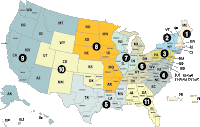We have held that a lender does not meet the test just by showing that payments a defaulting borrower owes are to be made in Florida...Financial statements 'provided' by mail or facsimile transmission do not necessarily entail any action in Florida on the provider’s part...The Fifth Distict has specifically rejected the contention that simply executing a guaranty of a loan a Florida bank makes creates the requisite minimum contacts. See Holton v. Prosperity Bank of St. Augustine, 602 So. 2d 659, 662-63 (Fla. 5th DCA 1992) ("[A] guarantor’s mere obligation to honor a payment obligation of another, even if that obligation is required to be made in Florida is not a substantial activity to subject the nonresident guarantor to the jurisdiction of a Florida court." (citing Hotchkiss v. FMC Corp., 561 So. 2d 1261 (Fla. 2d DCA 1990))).
On the other hand, guaranties of notes given to finance the sale of goods in Florida, secured by a security agreement filed in Florida, and intended "to provide funds for operating a business in Florida," were held to provide the requisite contacts for asserting personal jurisdiction over the guarantor, at least where the guarantor had "business contacts" in Florida and "serve[d] as a trustee of a college in Florida." Hamilton v. Bus. Assistance Consortium, Inc., 602 So. 2d 619, 621 (Fla. 3d DCA 1992). Although the Fourth District said in Harris v. Caribank, 536 So. 2d 394, 396 (Fla. 4th DCA 1989), which, like the present case, involved "a mortgage on property located in Florida," that the "fact that payment was to be made in Florida, and the fact that payment was not made, would appear to be enough to bring the Harrises within the scope of section 48.193(1)(a)," the separate, constitutional issue of minimum contacts may have turned on the fact that the guaranties in that case "specified Florida as . . . the jurisdictional forum for deciding legal disputes between the parties." Id. at 395-96. But see Hamilton , 602 So. 2d at 621 (stating that "even with a choice of forum clause, it is necessary to establish that a guarantor has minimum contacts with the forum state" (citations omitted)).Because we have held that even an unconditional obligation to make payments in Florida does not, by itself, establish that the obligor has constitutionally sufficient contact with Florida to support personal jurisdiction, see Ganiko, 826 So. 2d at 395; see also Edwards, 473 So. 2d at 37, we do no more than adhere to precedent in holding that the contingent obligation a guaranty represents remains, even in the event of default, a constitutionally inadequate basis for personal jurisdiction. We reject the argument that furnishing financial statements in connection with a guaranty makes a material difference.



0 comments:
Post a Comment